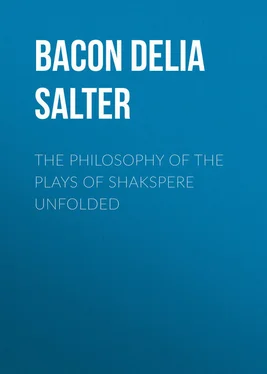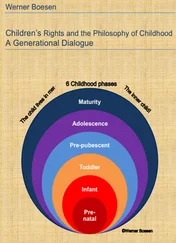Delia Bacon - The Philosophy of the Plays of Shakspere Unfolded
Здесь есть возможность читать онлайн «Delia Bacon - The Philosophy of the Plays of Shakspere Unfolded» — ознакомительный отрывок электронной книги совершенно бесплатно, а после прочтения отрывка купить полную версию. В некоторых случаях можно слушать аудио, скачать через торрент в формате fb2 и присутствует краткое содержание. Жанр: literature_19, foreign_antique, foreign_prose, на английском языке. Описание произведения, (предисловие) а так же отзывы посетителей доступны на портале библиотеки ЛибКат.
- Название:The Philosophy of the Plays of Shakspere Unfolded
- Автор:
- Жанр:
- Год:неизвестен
- ISBN:нет данных
- Рейтинг книги:3 / 5. Голосов: 1
-
Избранное:Добавить в избранное
- Отзывы:
-
Ваша оценка:
- 60
- 1
- 2
- 3
- 4
- 5
The Philosophy of the Plays of Shakspere Unfolded: краткое содержание, описание и аннотация
Предлагаем к чтению аннотацию, описание, краткое содержание или предисловие (зависит от того, что написал сам автор книги «The Philosophy of the Plays of Shakspere Unfolded»). Если вы не нашли необходимую информацию о книге — напишите в комментариях, мы постараемся отыскать её.
The Philosophy of the Plays of Shakspere Unfolded — читать онлайн ознакомительный отрывок
Ниже представлен текст книги, разбитый по страницам. Система сохранения места последней прочитанной страницы, позволяет с удобством читать онлайн бесплатно книгу «The Philosophy of the Plays of Shakspere Unfolded», без необходимости каждый раз заново искать на чём Вы остановились. Поставьте закладку, и сможете в любой момент перейти на страницу, на которой закончили чтение.
Интервал:
Закладка:
But who supposes that these men were so wholly super-human, so devoid of mortal affections and passions, so made up of 'dry light,' that they could retreat, with all those regal faculties, from the natural sphere of their activity to the scholar's cell, to make themselves over in books to a future in which their mortal natures could have no share, – a future which could not begin till all the breathers of their world were dead? Who supposes that the 'staff' of Prospero was the first choice of these chiefs? – these 'heads of the State,' appointed of nature to the Cure of the Common-Weal.
The leading minds of that age are not minds which owed their intellectual superiority to a disproportionate development of certain intellectual tendencies, or to a dwarfed or inferior endowment of those natural affections and personal qualifications which tend to limit men to the sphere of their particular sensuous existence. The mind of this school is the representative mind, and all men recognise it as that, because, in its products, that nature which is in all men, which philosophy had, till then, scorned to recognise, which the abstractionists had missed in their abstractions, – that nature of will, and sense, and passion, and inanity, is brought out in its true historical proportions, not as it exists in books, not as it exists in speech, but as it exists in the actual human life. It is the mind in which this historical principle, this motivity which is not reason, is brought in contact with the opposing and controlling element as it had not been before. In all its earth-born Titanic strength and fulness, it is dragged up from its secret lurking-places, and confronted with its celestial antagonist. In all its self-contradiction and cowering unreason, it is set face to face with its celestial umpire, and subjected to her unrelenting criticism. There are depths in this microcosm which this torch only has entered, silences which this speaker only has broken, cries which he only knows how to articulate.
'The soundest disclosing and expounding of men is by their natures and ends ,' so the one who is best qualified to give us information on this question tells us, – by their natures and ends; 'the weaker sort by their natures, and the wisest by their ends'; and ' the distance ' of this wisest sort 'from the ends to which they aspire,' is that 'from which one may take measure and scale of the rest of their actions and desires.'
The first end which these Elizabethan Men of Letters grasped at, the thing which they pursued with all the intensity and concentration of a master passion, was — power , political power. They wanted to rule their own time, and not the future only. 'You are hurt, because you do not reign,' is the inuendo which they permit us to apply to them as the key to their proceedings. 'Such men as this are never at heart's ease,' Caesar remarks in confidence to a friend, 'whiles they behold a greater than themselves.' 'Come on my right hand, for this ear is deaf,' he adds, 'and tell me truly what thou think'st of him.' These are the kind of men that seek instinctively 'predominance,' not in a clique or neighbourhood only, – they are not content with a domestic reflection of their image, they seek to stamp it on the state and on the world. These Elizabethan Men of Letters were men who sought from the first, with inveterate determination, to rule their own time, and they never gave up that point entirely. In one way or another, directly or indirectly, they were determined to make their influence felt in that age, in spite of the want of encouragement which the conditions of that time offered to such an enterprise. But they sought that end not instinctively only, but with the stedfastness of a rational, scientifically enlightened purpose. It was an enterprise in which the intense motivity of that new and so 'conspicuous' development of the particular and private nature, which lies at the root of such a genius, was sustained by the determination of that not less superior development of the nobler nature in man, by the motivity of the intellect, by the sentiment which waits on that , by the motive of 'the larger whole,' which is, in this science of it, 'the worthier.'
We do not need to apply the key of times to those indirectly historical remains in which the real history, the life and soul of a time, is always best found, and in which the history of such a time, if written at all, must necessarily be inclosed; we do not need to unlock these works to perceive the indications of suppressed movements in that age, in which the most illustrious men of the age were primarily concerned, the history of which has not yet fully transpired. We do not need to find the key to the cipher in which the history of that time is written, to perceive that there was to have been a change in the government here at one time, very different from the one which afterwards occurred, if the original plans of these men had succeeded. It is not the Plays only that are full of that frustrated enterprise.
These were the kind of men who are not easily baffled. They changed their tactics, but not their ends; and the enterprises which were conducted with so much secresy under the surveillance of the Tudor, began already to crown themselves as certainties, and compare their 'olives of endless age' with the spent tombs of brass' and 'tyrant's crests,' at that sure prospect which, a change of dynasties at that moment seemed to open, – at least, to men who were in a position then to estimate its consequences.
That this , at all events, was a state of things that was not going to endure, became palpable about that time to the philosophic mind. The transition from the rule of a sovereign who was mistress of 'the situation,' who understood that it was a popular power which she was wielding – the transition from the rule of a Queen instructed in the policy of a tyranny, inducted by nature into its arts, to the policy of that monarch who had succeeded to her throne, and whose 'CREST' began to be reared here then in the face of the insulted reviving English nationality, – this transition appeared upon the whole, upon calmer reflection, at least to the more patient minds of that age, all that could reasonably at that time be asked for. No better instrument for stimulating and strengthening the growing popular sentiment, and rousing the latent spirit of the nation, could have been desired by the Elizabethan politicians at that crisis, 'for the great labour was with the people' – that uninstructed power, which makes the sure basis of tyrannies – that power which Mark Antony takes with him so easily – the ignorant, tyrannical, humour-led masses – the masses that still roar their Elizabethan stupidities from the immortal groups of Coriolanus and Julius Caesar. We ourselves have not yet overtaken the chief minds of this age; and the gulf that separated them from those overpowering numbers in their own time, to whose edicts they were compelled to pay an external submission, was broad indeed. The difficulty of establishing an understanding with this power was the difficulty. They wanted that 'pulpit' from which Brutus and Mark Antony swayed it by turns so easily – that pulpit from which Mark Antony showed it Caesar's mantle. They wanted some organ of communication with these so potent and resistless rulers – some 'chair' from which they could repeat to them in their own tongue the story of their lost institutions, and revive in them the memory of ' the kings their ancestors' – some school in which they could collect them and instruct them in the scientific doctrine of the commons , the doctrine of the common- weal and its divine supremacy. They wanted a school in which they could tell them stories – stories of various kinds – such stories as they loved best to hear – Midsummer stories, or Winter's tales, and stories of their own battle-fields – they wanted a school in which they could teach the common people History (and not English history only), with illustrations, large as life, and a magic lantern to aid them, – 'visible history.'
Читать дальшеИнтервал:
Закладка:
Похожие книги на «The Philosophy of the Plays of Shakspere Unfolded»
Представляем Вашему вниманию похожие книги на «The Philosophy of the Plays of Shakspere Unfolded» списком для выбора. Мы отобрали схожую по названию и смыслу литературу в надежде предоставить читателям больше вариантов отыскать новые, интересные, ещё непрочитанные произведения.
Обсуждение, отзывы о книге «The Philosophy of the Plays of Shakspere Unfolded» и просто собственные мнения читателей. Оставьте ваши комментарии, напишите, что Вы думаете о произведении, его смысле или главных героях. Укажите что конкретно понравилось, а что нет, и почему Вы так считаете.












